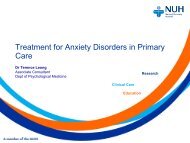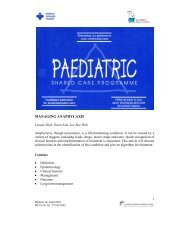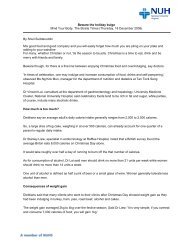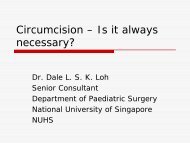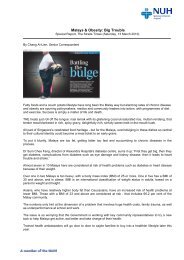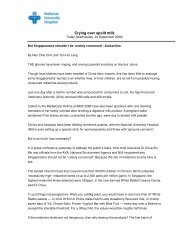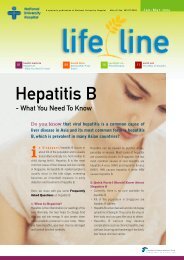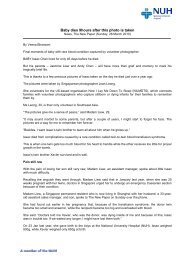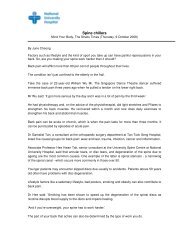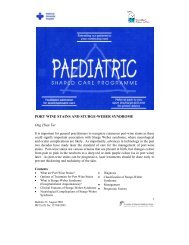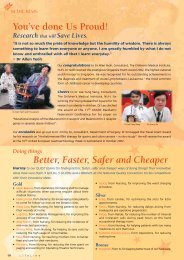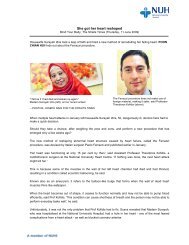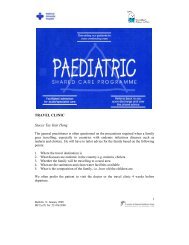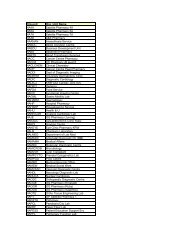Dual Organ Transplant – Double the Bliss - NUH
Dual Organ Transplant – Double the Bliss - NUH
Dual Organ Transplant – Double the Bliss - NUH
You also want an ePaper? Increase the reach of your titles
YUMPU automatically turns print PDFs into web optimized ePapers that Google loves.
<strong>NUH</strong> news bites<br />
04<br />
<strong>NUH</strong>S Residency Programme Receives<br />
ACGME-I Accreditation<br />
The National University Health<br />
System (<strong>NUH</strong>S) Residency<br />
Programme is now one of <strong>the</strong><br />
few outside <strong>the</strong> US to be accredited by<br />
<strong>the</strong> Accreditation Council of Graduate<br />
Medical Education-International<br />
(ACGME-I), a non-governmental<br />
organisation responsible for <strong>the</strong><br />
accreditation of international Graduate<br />
Medical Education (GME) programmes.<br />
The six specialist training programmes<br />
that have been accredited include<br />
Emergency Medicine, Internal Medicine,<br />
Paediatrics, Pathology (Preventive<br />
Medicine and Transitional Year). The<br />
accreditation is testimony that <strong>the</strong>se<br />
programmes have been assessed to<br />
provide high quality training which is<br />
comparable with <strong>the</strong> standards set for<br />
<strong>the</strong> US.<br />
The <strong>NUH</strong>S postgraduate training<br />
programme for doctors moved from<br />
UK-based training to <strong>the</strong> US-styled<br />
ACGME-I in May 2010. Under <strong>the</strong><br />
ACGME-I structure, trainee doctors (or<br />
residents) undergo structured specialist<br />
training conducted by dedicated senior<br />
clinicians after graduating from medical<br />
school. They are regularly assessed on<br />
<strong>the</strong>ir medical knowledge, patient care<br />
skills, professionalism, interpersonal and<br />
communication skills. This ensures <strong>the</strong><br />
aspiring specialists are well-trained and<br />
equipped with <strong>the</strong> necessary skills and<br />
knowledge before <strong>the</strong>y see <strong>the</strong>ir first<br />
patients.<br />
One of <strong>the</strong> key strengths of <strong>the</strong> ACGME programme is that of structured training -<br />
what needs to be taught in <strong>the</strong> curriculum is not left to chance but it will be planned to be<br />
covered.<br />
A director and core faculty with dedicated time for teaching and curriculum development<br />
are specially appointed for each programme. The very structured program evaluation with<br />
<strong>the</strong> sponsoring institutions having ‘ownership’ of <strong>the</strong> residents, will hopefully improve <strong>the</strong><br />
standard of training and teaching among <strong>the</strong> residents.<br />
With <strong>the</strong> programme, <strong>the</strong> residents will be able to receive timely feedback and remediation<br />
ra<strong>the</strong>r than wait till <strong>the</strong> intermediate/final exams to know <strong>the</strong>ir gaps in knowledge.<br />
Associate Professor Shirley Ooi, Designated Institutional Official,<br />
<strong>NUH</strong>S Residency Programme<br />
Residents like myself now undergo a structured education programme that is wellsupervised.<br />
We now have designated protected time for teaching and regular sessions<br />
with our Programme Directors on our learning and performance. This represents a major<br />
change from <strong>the</strong> existing system where learning is largely opportunistic and mostly takes<br />
place in our free time.<br />
Dr Ng Chew Lip, <strong>NUH</strong>S Resident<br />
The <strong>NUH</strong>S Residency Programme is<br />
one of <strong>the</strong> three postgraduate medical<br />
training programmes in Singapore.<br />
Thirty specialists from <strong>the</strong> first batch are<br />
expected to graduate in 2013, adding to<br />
<strong>the</strong> 907-strong clinical staff at <strong>NUH</strong>.<br />
Irregular meals, Helicobacter pylori infection and gastritis<br />
According to a recent study conducted by <strong>the</strong> Dietetics Department at<br />
<strong>the</strong> <strong>NUH</strong>, people who eat irregular meals too often are likely to raise <strong>the</strong>ir<br />
risks of getting Helicobacter pylori (HP) infection, which may in turn up<br />
<strong>the</strong>ir risks of gastric cancer.<br />
Helicobacter pylori (HP) is a type of bacteria that can penetrate and infect <strong>the</strong><br />
protective layer of <strong>the</strong> stomach lining, causing <strong>the</strong> individual to develop gastritis<br />
or an inflamed stomach lining.<br />
“We found that people who frequently ate earlier or later than <strong>the</strong>ir usual meal<br />
timings and over a prolonged period were associated with a significantly higher<br />
incidence of HP infection and gastritis,” said Ms Lim Su Lin, <strong>NUH</strong>’s chief dietician<br />
who led <strong>the</strong> study.<br />
Results showed that compared with individuals who had regular eating patterns,<br />
those who deviated from <strong>the</strong>ir meal times by exactly or more than two hours at least<br />
twice a week were six times more at risk of developing HP <strong>–</strong> a condition estimated<br />
to affect 30 per cent of Singaporeans. People infected with HP are at increased risk<br />
of gastric cancer in <strong>the</strong> long run.<br />
The study won <strong>the</strong> Singapore Allied Health Award at <strong>the</strong> inaugural Singapore<br />
Health and Biomedical Congress jointly organised by <strong>the</strong> National University<br />
Health System and National Healthcare Group late last year.<br />
Four fast tips on managing your diet<br />
while keeping up with a busy schedule<br />
1. Fix your meal times and keep to that<br />
schedule as much as you can.<br />
2. Keep some snacks at hand in case you<br />
are held up at work or long meetings.<br />
Consider healthy snack bars, fruits or<br />
dried fruits, nuts or biscuits.<br />
3. Whatever little you can have is better<br />
than nothing. Don’t fix your meetings or<br />
appointments during lunch time if you can<br />
help it. O<strong>the</strong>rwise, try to bring along your<br />
lunch or check if lunch is provided.<br />
4. Have a quick bite before meetings if <strong>the</strong>y<br />
are likely to stretch beyond your usual<br />
lunch time.



